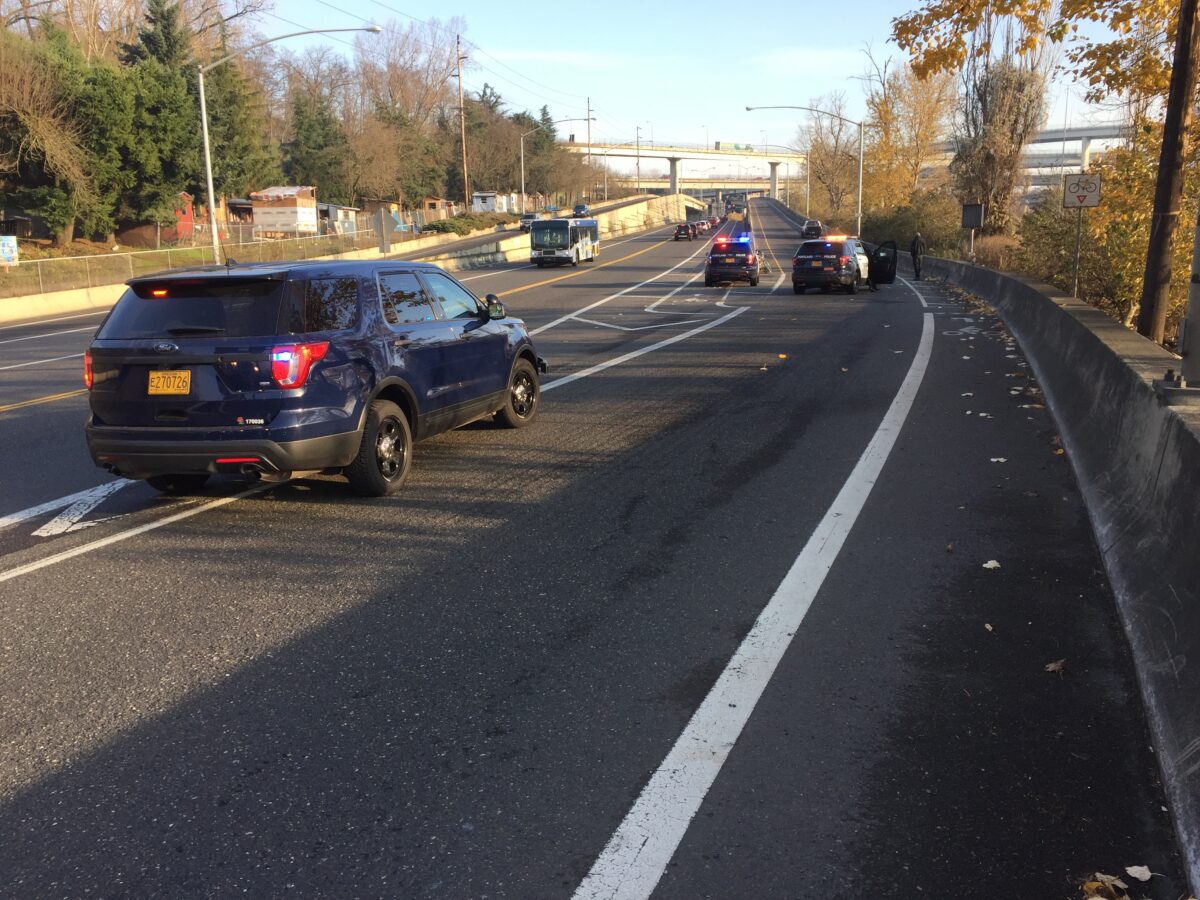
(Photos: Portland Police Bureau)
A notorious stretch of North Greeley Avenue where it crosses over an on-ramp to Interstate 5 is the subject of a lawsuit filed yesterday by a Portland law firm.

Thomas, Coon, Newton & Frost lists three defendants — the City of Portland, the State of Oregon and the driver, Brandon Swiger — and asks for $1.36 million on behalf of their client, Robert Smith.
Smith sustained life-altering injuries as a result of being hit by Swiger while bicycling on Greeley on December 21st, 2017. Smith’s medical expenses to treat a traumatic brain injury, multiple bone fractures, collapsed lungs, and injuries to internal organs have totaled over $359,229.
The complaint (below) filed yesterday in Multnomah County makes claims of negligence against Swiger for his careless driving and against the city and state for their failure to manage and maintain the roadway.
[pdf-embedder url=”https://bikeportland.org/wp-content/uploads/2018/08/p-Complaint-Robert-Smith-CONFORMED.pdf” title=”p-Complaint- Robert Smith-CONFORMED”]
According to the police report, Swiger was driving southbound on Greeley on his way home from work at about 1:45 pm in his Honda Crossover (a mid-sized SUV) prior to the crash. There are two driving lanes at this location; the left lane curves eastward toward Interstate Avenue and the right lane goes onto the I-5 ramp. According to witnesses and Swiger’s own statement to the responding police officer, Swiger had moved into the left lane prior to the merge to pass another driver and then moved back into the right lane just before making impact with Smith’s body.
“In addition to this location being a known safety hazard, there was plenty of notice to the responsible authority that it should be fixed or somebody was going to get hurt, so was pretty frustrating when it actually happened.”
— Ray Thomas, attorney for Robert Smith
The police report states that Swiger estimated his speed to be around 55-60 mph. The posted speed limit is 45 mph.
One witness who saw the collision told police that Swiger and another driver both passed her, “As if we were standing still.” Another witness said Swiger had been “tailgating” her prior to changing lanes. As a result of his behavior, Swiger was issued a citation for Careless Driving with Serious Injury to a Vulnerable Road User (ORS 811.135(3)).
Swiger’s careless driving was amplified by an intersection with well-known design flaws that have been flagged as a hot-spot for collisions and close-calls for years.
Greeley is a busy, four-lane “freeway” (a term for the road used by a Portland Bureau of Transportation staff person in a meeting last year) where people using bicycles are required to merge from a relatively narrow curbside lane across a lane where people often drive 50-60 mph. The crossing is not signalized or marked except for a small caution sign off to the side of the road. In February 2016, in a report on a separate serious injury collision at this same location, I wrote that this is a completely unacceptable design for a bikeway.
The design is so dangerous, PBOT wants to shift the bikeway to the other side of the road.
Advertisement
In February of 2017, 10 months before Smith was hit, PBOT announced plans to build a physically protected, bi-directional multi-use path on the east side of Greeley. However, that project was delayed in July 2017 due to a contracting technicality and the timeline for completion was pushed back to this past spring. In June of this year PBOT announced another delay and the project is now expected to be built in spring 2019.
The lawsuit says PBOT and ODOT (the agencies have overlapping jurisdiction of the roads at this location) are negligent for six reasons:
a. Designing the intersection so as to require a cyclist in the southeast bound bike lane to cross a freeway entrance ramp where traffic routinely travels at 55-60 miles per hour;
b. Establishing a bike lane on N. Greeley Avenue southeast bound, knowing that bike lane would cross the freeway on-ramp;
c. Failing to provide a means of traveling on the southeast bound bike lane on N. Greeley Avenue without crossing the freeway on-ramp;
d. Failing to provide a bike lane on the northeast side of N. Greeley Avenue to accommodate both northwest and southeast-bound bicycle traffic;
e. Failing to warn approaching traffic of the bike lane crossing; and
f. Failing to close the bike lane until a safe design could be implemented
Smith’s attorneys are asking for $358,229 to pay his medical expenses and $1 million in non-economic damages.
In an interview yesterday, attorney Ray Thomas, a rider himself and well-known cycling advocate, said, “In addition to this location being a known safety hazard, there was plenty of notice to the responsible authority that it should be fixed or somebody was going to get hurt, so it was pretty frustrating when it actually happened.”
To win in court, Thomas and his partner on the lawsuit, Cynthia Newton, are likely to face an attempt by attorneys for the city and state to dismiss the case at the outset. They’re likely to argue their clients can’t be held liable by way of discretionary immunity, as outlined in ORS 30.265(6)(c). That statute says a public body is immune from liability for, “Any claim based upon the performance of or the failure to exercise or perform a discretionary function or duty, whether or not the discretion is abused.”
According to the Oregon Court of Appeals (John v. City of Gresham, 2007) discretionary immunity applies to policy decisions, “that involve a balancing of competing policy considerations in determining the public interest.”
Put another way, government agencies make decisions about how to allocate funds and design and maintain their roads, and the law protects them from being sued for making bad decisions. But there are exceptions. Among the reasons a judge might conclude that immunity does not apply are: if a public body decides on a course of action then fails to follow it; if their actions were based merely on fact (like whether or not a design conforms to national standards) and not a conscious judgment of policy; if they fail to respond to changing conditions; or if they fail to follow an established maintenance program.
Recent cases where PBOT and ODOT have been sued for negligence did not go to trial and resulted in settlements. In February 2017 the State of Oregon and the City of Portland agreed to pay the family of Martin Greenough $23,000 for their role in his death that resulted from an intoxicated driver hitting him in a bike lane gap on North Lombard. And in March of 2017, Portland paid a settlement of $525,000 to a man who was seriously injured while biking on a dangerous section of North Interstate Ave.
Win or lose, Thomas believes lawsuits are an effective way to hold government agencies accountable.
“I think these design and maintenance cases are important,” he shared with me earlier this week. “And if things go as they should with this case, what will happen is that the next time the city decides to dither on something, they’ll say, ‘Remember what happened on Greeley? We put it off and a guy got nailed just like everybody said was going to happen, and we got sued. So maybe this time we should expedite the process. We have a safer design, let’s expedite the process.’
— Jonathan Maus: (503) 706-8804, @jonathan_maus on Twitter and jonathan@bikeportland.org
Never miss a story. Sign-up for the daily BP Headlines email.
BikePortland needs your support.

